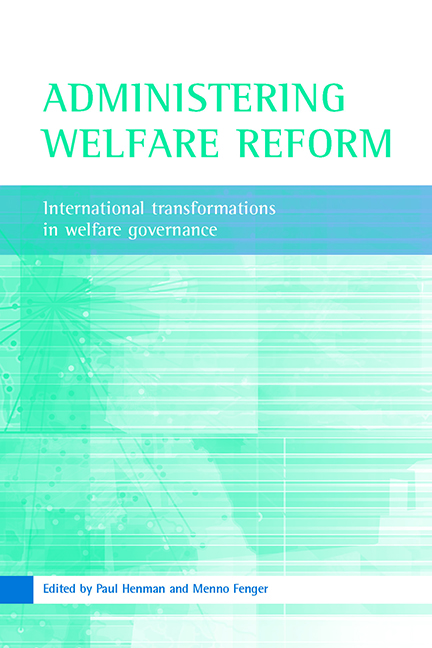Book contents
- Frontmatter
- Contents
- List of tables
- Preface
- Acknowledgements
- List of abbreviations
- Notes on contributors
- one Introduction: administering welfare reform
- two Welfare reform as governance reform: the prospects of a governmentality perspective
- Part One Participants: reforming the agents of welfare delivery
- Part Two Practices: the welfare governance of street-level practices
- Part Three Processes: the changing spaces of welfare governance
- Index
- Also available from The Policy Press
five - From charity to ‘not-for-profit’: changes in the role and structure of voluntary social service agencies
Published online by Cambridge University Press: 14 January 2022
- Frontmatter
- Contents
- List of tables
- Preface
- Acknowledgements
- List of abbreviations
- Notes on contributors
- one Introduction: administering welfare reform
- two Welfare reform as governance reform: the prospects of a governmentality perspective
- Part One Participants: reforming the agents of welfare delivery
- Part Two Practices: the welfare governance of street-level practices
- Part Three Processes: the changing spaces of welfare governance
- Index
- Also available from The Policy Press
Summary
Justice is not about measurable outcomes, justice is about opportunity, justice is about access, justice is about getting your right to a whole lot of basic life things. (Faith-based agency director)
From 1984 to 1999, New Zealand underwent 15 years of significant welfare reform and welfare state restructuring. In the US, President Clinton took office in 1993 declaring his commitment ‘to end welfare as we know it’ and in 1996 signed into law the Personal Responsibility and Work Opportunity Reconciliation Act (see Chapter Six of this book). This Act dramatically changed the welfare system. In the wake of these reforms, this chapter discusses changes regarding welfare governance as they relate to the role of the third sector or voluntary social service agencies. The chapter presents the results of a study into the organisational changes of non-government social provision agencies as they move from being charities to ‘not-for-profit businesses’ as state support for welfare declines in New Zealand and the US.
This chapter discusses findings from a study undertaken in 2001-02 on not-for-profit social service organisations in the regional city of Hamilton, a city of 166,000 people, in the context of changes in New Zealand welfare governance from 1984 to 1999 and in Tampa, Florida, a city of just over 300,000 people, following the US welfare reforms of the Clinton administration.
It is argued that the move from being charities to ‘not-for-profit businesses’ affected both the way that agencies were structurally organised in terms of their management and the types of clients that they were able to help. It is argued that because of the fiscal and procedural accountability that was demanded of them, the agencies made deliberate decisions to become ‘managerialist’ in their way of working and at the same time, albeit unconsciously, initiated a new concept of the deserving and undeserving.
The chapter is structured as follows. It starts with a description of the changes that occurred as New Zealand moved from a welfare state based on Keynesian philosophy to a market-led user-pays economy and the effects of the Clinton administration's welfare reform. Next, an overview is given of the research undertaken in Hamilton, New Zealand, and Tampa, Florida, US, of not-for-profit social service agencies. Then it focuses on the changes that have occurred in the structure and philosophies of these agencies and their move to managerialism and professionalisation.
- Type
- Chapter
- Information
- Administering Welfare ReformInternational Transformations in Welfare Governance, pp. 93 - 114Publisher: Bristol University PressPrint publication year: 2006



